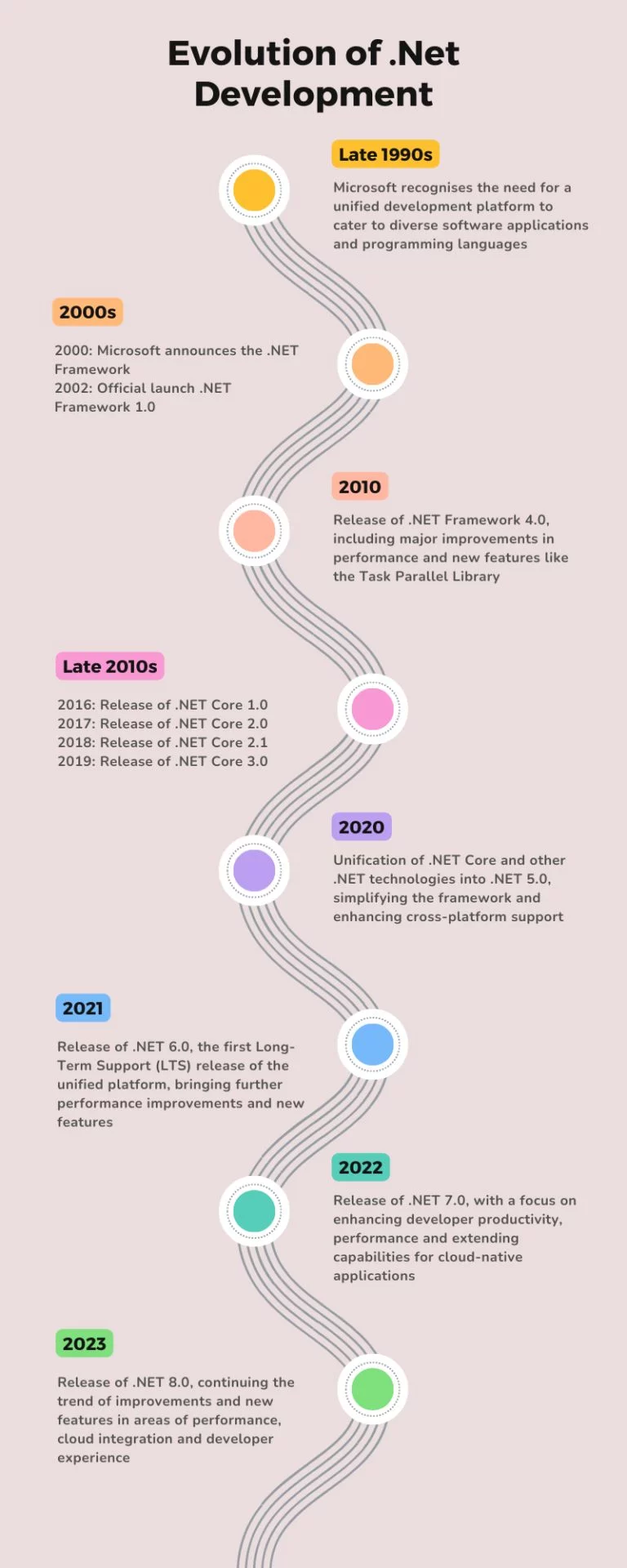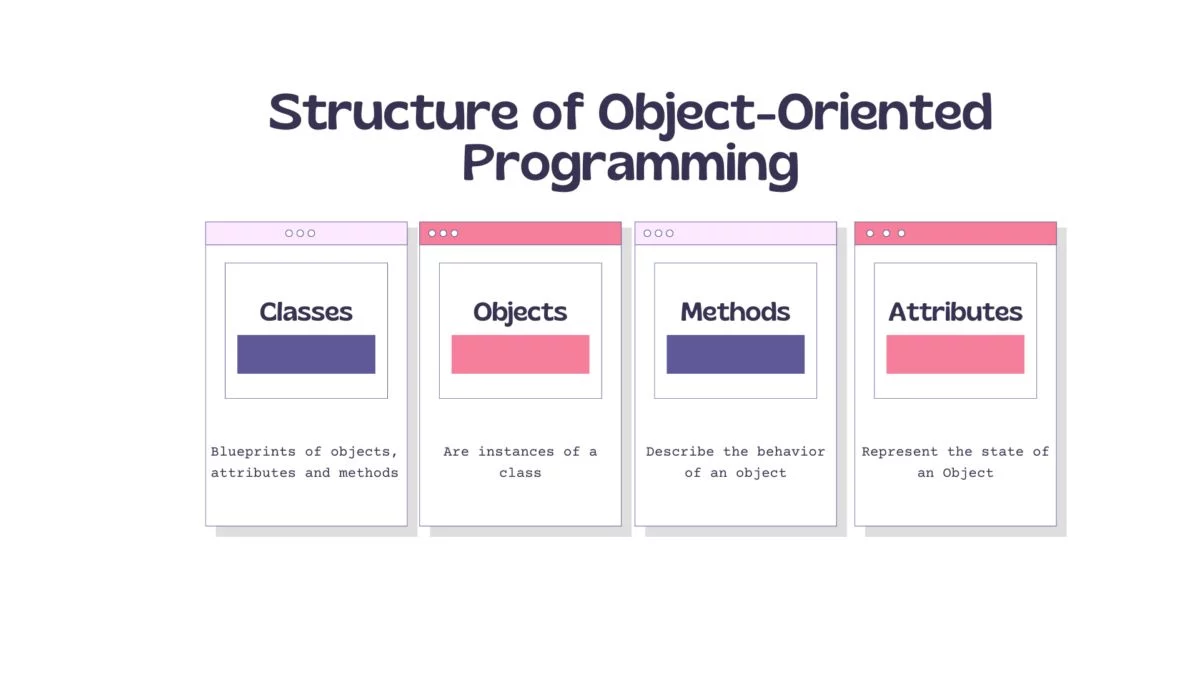
Table of Contents
.NET is a comprehensive software development platform developed by Microsoft, designed to provide developers with a robust framework for building a wide range of applications.
It encompasses a runtime environment, a rich class library, and a set of programming tools that support multiple programming languages, including C#, F#, and Visual Basic. The platform is known for its versatility, allowing the development of applications for web, desktop, mobile, cloud, and gaming environments.
.NET’s role in application development is pivotal as it offers a managed execution environment, automatic memory management, and a vast ecosystem of libraries and APIs that simplify complex programming tasks and enhance developer productivity.

The history of .NET began in the late 1990s when Microsoft recognised the need for a unified development platform that could accommodate the growing diversity of software applications and programming languages.
Officially launched in 2002, .NET started as a primarily Windows-based framework.
Over the years, it has undergone significant transformations, notably with the introduction of .NET Core in 2016, which expanded its capabilities to support cross-platform development for Windows, macOS, and Linux.
This evolution continued with the unification of .NET Core and other .NET technologies into .NET 5 and beyond, simplifying the framework and enhancing its ability to support modern application development across all platforms.
In the current technology landscape, .NET holds significant importance due to its continuous innovation and adaptation to new technological trends. It supports modern application development needs, including cloud-native applications, microservices architectures, and containerisation.
Microsoft’s commitment to open-source development and community involvement has further strengthened .NET’s position as a leading platform for developers around the world.
Key Features of .NET
- Cross-Platform Support: Enables development for Windows, macOS, and Linux.
- Language Diversity: Supports multiple languages, including C#, F#, and Visual Basic.
- Robust Base Class Library: Provides a comprehensive set of pre-built classes and functions.
- Modern Architecture: Supports cloud, AI, and IoT application development.
- Strong Community and Ecosystem: Benefits from a vibrant developer community and extensive third-party
Advantages of .NET
.NET development offers a multitude of advantages that make it a preferred choice for developers and businesses aiming to build robust, scalable, and efficient applications.
Code Reusability and Object-Oriented Programming
.NET heavily emphasises object-oriented programming (OOP), which facilitates code reusability and simplifies the development process.
This approach allows developers to create modular applications with reusable components, significantly reducing development time and improving maintainability.
The inherent modularity of OOP in .NET helps in managing larger projects by breaking them down into manageable pieces, each encapsulating specific functionalities.
Rich Libraries and Integrated Development Environment (IDE)
.NET benefits from a vast ecosystem of rich libraries that provide ready-to-use functionalities for a wide array of application needs, from complex data processing to graphical interface design.
Coupled with Visual Studio, Microsoft’s integrated development environment (IDE), developers have access to powerful tools for code editing, debugging, and project management.
Visual Studio enhances productivity with features like IntelliSense, code suggestions, and a comprehensive debugging environment.
Security Features
Security is a cornerstone of .NET development, with built-in features designed to protect applications from threats.
.NET includes robust security mechanisms such as validation and verification, encryption, code access security, and role-based security. These features help developers build secure applications by default, safeguarding data and processes against unauthorised access and vulnerabilities.
Cross-Platform Compatibility
With the introduction of .NET Core, developers can now build applications that run seamlessly across multiple platforms, including Windows, Linux, and macOS.
This cross-platform compatibility ensures that applications can reach a wider audience, catering to users on different operating systems without requiring separate codebases.
Scalability and Performance
.NET is designed for performance and scalability.
It efficiently handles the demands of large-scale applications, making it suitable for enterprises that require high performance under load.
The platform’s ability to integrate with various databases and its support for asynchronous programming model contribute to its high performance and scalability.

Support for Cloud-Based Development
.NET is optimised for the cloud, with native support for building and deploying applications in cloud environments, including Microsoft Azure.
This support encompasses modern cloud development practices such as microservices, containers, and serverless computing, allowing businesses to leverage the full potential of cloud technologies.
Summary Table of .NET Advantages
Advantage | Description |
Code Reusability & OOP | Enables modular, maintainable code with reusable components. |
Rich Libraries & IDE | Provides extensive pre-built functionalities and a powerful development environment with Visual Studio. |
Security Features | Includes built-in mechanisms for robust application security. |
Cross-Platform Compatibility | Supports development for multiple operating systems including Windows, Linux, and macOS. |
Scalability and Performance | Handles large-scale applications efficiently, suitable for enterprise needs. |
Cloud-Based Development Support | Optimised for cloud environments, supporting modern cloud practices like microservices and serverless computing. |
.NET in the Business Environment
.NET development plays a crucial role in the business environment by offering robust integration capabilities, adaptability to specific business needs, and reliable long-term support.
These features make it an ideal platform for enterprises looking to enhance their technological infrastructure.
Integration with Business Systems

.NET excels in its ability to integrate seamlessly with various business systems, such as Customer Relationship Management (CRM) and Enterprise Resource Planning (ERP) systems.
This integration is facilitated through .NET’s comprehensive APIs and middleware solutions, which allow for efficient data exchange and process automation between disparate systems.
By connecting .NET applications with CRM and ERP systems, businesses can streamline operations, improve data accuracy, and enhance decision-making processes.
Adaptability to Business Needs
The modular and adaptable framework of .NET is designed to meet specific business requirements.
Its architecture supports the development of customised solutions that can be tailored to address unique business challenges.
Whether it is for developing new modules to add specific functionalities or modifying existing applications to improve performance, .NET provides the flexibility needed to adapt to changing business environments.
This adaptability extends to various sectors, including finance, healthcare, and retail, where tailored solutions are often necessary.
Long-Term Support and Maintenance
Microsoft provides strong long-term support and maintenance for .NET, which is a significant advantage for businesses.
This support includes regular updates, security patches, and improvements that ensure the stability and security of .NET applications over time.
Microsoft’s commitment to the .NET framework reduces the risk for businesses and lowers future costs associated with software maintenance and upgrades.
Summary Table of .NET in Business Environment
Feature | Benefits |
Integration with Business Systems | Seamless data exchange with CRM, ERP, and other systems. |
Adaptability to Business Needs | Customizable framework that can be tailored to specific requirements. |
Long-Term Support and Maintenance | Reliable support from Microsoft, ensuring stability and reduced maintenance costs. |
.NET’s integration capabilities, adaptability, and reliable support make it a strategic choice for businesses aiming to leverage technology for competitive advantage.
These features ensure that .NET-based solutions can grow and evolve in alignment with business goals, providing a sustainable and efficient technological foundation.
Best Practices in .NET Development
Adhering to best practices in .NET development is crucial for creating maintainable, secure, and efficient applications.
These practices not only enhance code quality but also streamline development processes, making them more efficient and less prone to errors.
Coding Standards and Best Practices
In .NET development, maintaining a consistent set of coding standards and best practices is essential for ensuring code quality and maintainability.
These standards typically cover naming conventions, code structure, commenting, and error handling, among other aspects.
Adhering to these standards helps in creating a codebase that is easy to read, understand, and modify, which is particularly important in collaborative environments where multiple developers work on the same project.
Tools like StyleCop and ReSharper can assist in enforcing these standards automatically.

Security and Performance Optimisation
Security is a paramount concern in .NET development. Implementing secure coding practices such as input validation, proper error handling, and adherence to the principle of least privilege can help mitigate potential security vulnerabilities.
For performance optimisation, .NET developers should focus on efficient memory management, proper use of caching, and optimising data access and algorithms. Profiling tools and performance benchmarks are essential for identifying bottlenecks and areas for improvement.
Continuous Integration and Deployment
Continuous Integration (CI) and Continuous Deployment (CD) play a critical role in modern .NET development by automating the build, test, and deployment processes.
CI/CD practices help in detecting integration issues early, improving code quality, and reducing the time to market. Tools like Jenkins, TeamCity, or Azure DevOps provide robust support for setting up CI/CD pipelines, facilitating regular code integration, and automated deployments to various environments.
Summary of Best Practices in .NET Development
Best Practice | Benefits |
Coding Standards and Best Practices | Enhances code readability and maintainability. |
Security and Performance Optimisation | Secures applications and improves efficiency. |
Continuous Integration and Deployment | Streamlines development processes and ensures code quality. |
By implementing these best practices, .NET developers can ensure that their applications are not only functional but also robust, secure, and easy to maintain.
This approach ultimately leads to higher-quality software and more efficient development cycles.
Getting Started with .NET
Getting started with .NET involves making informed decisions about the platform version and assembling a skilled development team. These initial choices are crucial for the success of any .NET development project.
Choosing the Right .NET Version
Selecting the appropriate .NET version is essential for aligning with business goals and technical requirements.
Microsoft currently offers several iterations of .NET, including .NET Framework, .NET Core, and the latest unified platform, .NET 5 and onwards. For new projects, .NET 5 or later is recommended due to its long-term support, cross-platform capabilities, and performance improvements.
However, for applications that rely on Windows-specific libraries or APIs, the .NET Framework may still be necessary. Businesses should consider factors such as the project’s target platform, performance requirements, and future maintenance expectations when choosing a .NET version.
Hiring Skilled Developers
The success of .NET projects heavily relies on the expertise of the development team.
Skilled .NET developers can leverage the platform’s features effectively, ensuring robust, scalable, and secure applications.

When hiring developers, look for experience in the specific .NET version you plan to use, as well as a solid understanding of object-oriented programming, database management, and web technologies.
Utilising professional networks, tech recruitment platforms, and consulting with specialised recruitment agencies can help find the right talent.
Additionally, assessing technical skills through coding tests and reviewing past project portfolios is advisable to ensure the developers’ capabilities align with project needs.
How Websparks Can Help Your .Net Development
Whether you’re looking to build robust, scalable applications or need expert guidance on leveraging the latest .NET technologies, our experienced developers are here to help.
With our deep expertise in .NET Framework, .NET Core, and the latest .NET versions, we provide tailored solutions that meet your unique business needs.
Reasons to Choose Websparks for Your .NET Development
- Expertise Across Platforms: Our developers are skilled in creating applications for web, desktop, mobile, and cloud environments.
- Custom Solutions: We design and implement custom .NET solutions that align with your business goals and technical requirements.
- Security and Performance: Our focus on security and performance ensures your applications are robust and reliable.
- Seamless Integration: We facilitate smooth integration with your existing business systems, including CRM and ERP solutions.
- Long-Term Support: Benefit from our ongoing support and maintenance to keep your applications up-to-date and secure.
Transform your ideas into reality with Websparks.
Contact us now to discuss your .NET development needs and discover how we can help you achieve your goals.


